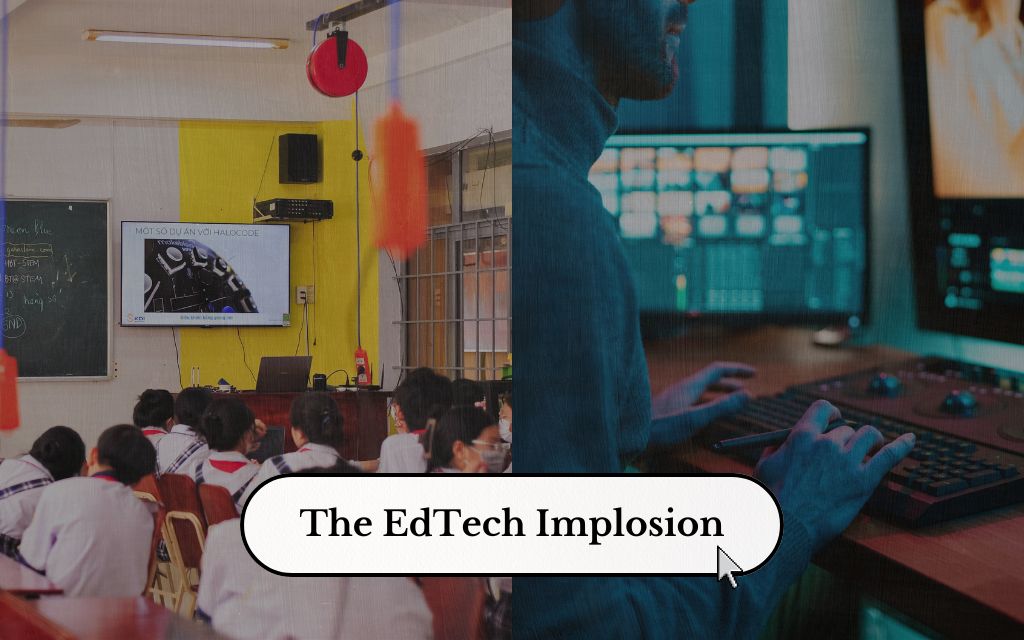The EdTech industry was once booming, but now, we can see many parts of it collapsing. From online models like Byju’s and Unacademy to offline models like FIITJEE, we have witnessed a decline in their performance in various areas. The reasons behind these downfalls are numerous, including financial struggles, lack of student engagement, and increasing competition. Whether it is offline or online models, both are facing their own issues.
The Rise of EdTech in India
India has seen a rise in online education, which requires Internet access for all. According to a 2025 TRAI report, 68.8% of India’s population has internet access, enabling them to engage in online learning. However, government initiatives like Digital India promote digital literacy and Internet access for the rest of the population, generating more opportunities for online learning.
The Edtech industry expanded during the pandemic, particularly its online models, but faced challenges after the post-pandemic era, when many aspects of life returned to offline operations. The imbalance between online and offline models has led to the implosion of EdTech.
The Professional’s Input

Unnati Srivastava, a customer success executive at Byju’s, Gurugram, added, “The Byju’s online model faced a backlash when students started comparing it to the offline models of learning, shifting students to an offline approach. We see that students enrol in online courses, but most of them never complete their courses.” This comment shows the behavioural change in students facing issues regarding focus and concentration in the online learning approach.” Riddhi Sharma, a student of CBSE Class 11 from East Delhi, says, “I used to love learning from online videos, but after everything has gone back to offline mode, I find it difficult to concentrate on online content.”
Naman Maini, a business development associate at Byju’s in Gurugram, also shared his experience with The Voices, stating, “The pressure to sell online courses is so high that the focus shifts from quality to quantity, affecting the working of the company.”
Is the Decline of EdTech Evident?
Byju’s, an EdTech company, introduced online education in India. The Economic Times study mentions that the company faced setbacks when its valuation fell from USD 22 billion to USD 20 billion in early 2024.
However, as witnessed, offline models are also leading to downfalls, as they do not offer the same level of flexibility as online models and are significantly more costly due to expenses such as infrastructure and in-person faculty. Even the 2-year classroom program for IIT preparation in FIITJEE offline centres costs around 5 lakh, whereas it is less than 40% for online courses. This reflects the affordability of prices at both offline and online centres.

The Solution Moving Forward
Yash, an ex-student of FIITJEE, stated, “The services provided by FIITJEE are no different from its competitors, yet its fees are much higher than theirs.” Students prefer hybrid classes, which are more comfortable for them, but are not available for every program at FIITJEE.
Pinki Kumari, admission counsellor of FIITJEE Punjabi Bagh, told The Voices, “FIITJEE keeps increasing its fee with each admission test, which is not affordable for a middle-class student. This results in students moving to other institutes.”
High fees, rising competition, and changes in student preference led to the setback of the institute, which further escalated into financial issues. The marketing associate of FIITJEE, Punjabi Bagh, who wants to remain anonymous, added, “Students do not choose FIITJEE due to various factors such as high fees and the recent crisis that FIITJEE faced, but we are working on these issues and promise to come back stronger.”
The hybrid model, a combination of offline and online, is emerging as a winner as it suits the flexible needs of the students. Considering all the situations stated, companies need to understand the importance of quality education over profit margins.
Copy Editor: Mandrupkar Nusrat Md. Rafi

